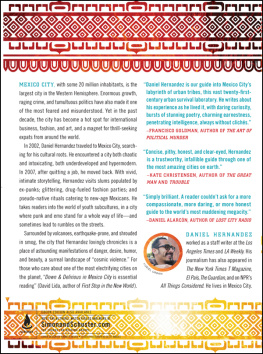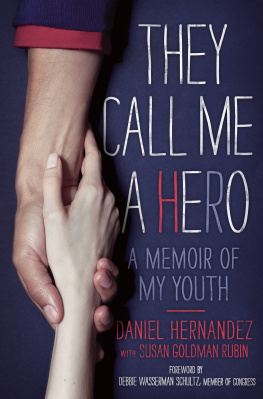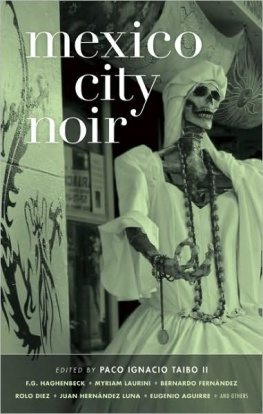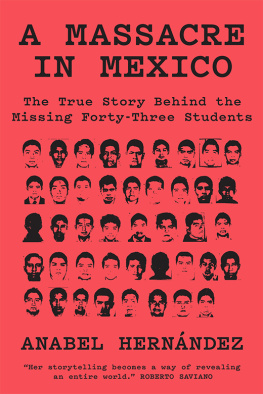More advance praise for
Down & Delirious in Mexico City
This guy can really write!
ALMA GUILLERMOPRIETO, author of Dancing with Cuba
In Mexico City, trends, fashions, youth lifestylespunks, emos, and hipsters, like hippies and Beats long beforearrive from the U.S. and are adopted and mutate until they are as Mexican as anything. Unlike in the U.S., they never really go away. Daniel Hernandez is our guide into this labyrinth of urban tribes, this vast twenty-first-century urban survival laboratory. He writes about his experience as he lived it, with daring curiosity, bursts of stunning poetry, charming earnestness, penetrating intelligence, always without clichs. The reader witnesses Hernandezs transformation, too, from down-and-delirious gringo outsider into totally down-and-delirious chilango.
FRANCISCO GOLDMAN, author of The Art of Political Murder
Daniel Hernandez writes with forthright generosity of spirit and intelligent acuity. Told from the perspective of a fascinated outsider gradually becoming a knowing insider, Down and Delirious in Mexico City takes us into a teeming, complex, vast, dark city of wonders, its people and places, cultures and rituals, food and drink, history and present. Concise, pithy, honest, and clear-eyed, Hernandez is a trustworthy, infallible guide through one of the most amazing cities on earth.
KATE CHRISTENSEN, author of The Great Man and Trouble
Daniel Hernandez takes on Mexico City, and the results are simply brilliant. A reader couldnt ask for a more compassionate, more daring, or more honest guide to the worlds most maddening megacity. The beauty and terror, the dynamism and precariousness of life in El Defectuoso is vividly portrayed on every page of this important book.
DANIEL ALARCN, author of Lost City Radio
Guided by his passions, Daniel Hernandez let himself become engulfed by Mexico Citys complexity and contradictions. He got very deeply into el D.F. very quickly. His marvelous Down and Delirious in Mexico City is essential reading for anyone who cares about this confusing and misunderstood megalopolis, and particularly what it means to be young here.
DAVID LIDA, author of First Stop in the New World: Mexico
City, the Capital of the 21st Century
Daniel Hernandez navigates the beautiful chaos of Mexico City with a reporters tenacity, an adventurers daring, and an open heart that allows him to discover the history that lives inside him. His lush, eyewitness portrayals take you inside the crush of crowds that pop up all over Mexico Cityat soccer stadiums, religious pilgrimages, art happenings and always the dance floor. A gorgeously done book.
LAURIE OCHOA, co-founder and editor of Slake: Los Angeles
This is Mexico City as seen from its quaking mosh pit, a ferocious ancient-modern swirl of passion, bodies, style, and release. Hernandez is a Mexican gringo on an urban pilgrims quest, pulled between fearlessness and introspection, the street and the keyboard, the North and the South. Lets Go Mexico City this isnt, and were all the better for it.
JOSH KUN, University of Southern California
Pitch-perfect and incandescent. Hernandezs shape-shifting abilities take us from emo to punk to neo-Aztec; from new age to old school to trans-everything, then back again only to find ourselves transmuted into something else. If Hernandez started off as a visitor, as many great writers who have written about Mexico didfrom Artaud, Kerouac and Burroughs to Bolaohe adopts and is adopted by this city and is now truly a chilango insider. His narrative of grit, glitter, and glory is not only a must re-read, it is an invitation to live.
GABRIELA JAUREGUI, author of Controlled Decay
Legions of writers have made the pilgrimage to the Aztec capitalfrom Breton to Lowry, from Lawrence to Burroughsbut few stayed long enough or wandered far enough from the expat-friendly circuit in this most iconic capital of the Global South. Daniel Hernandez crisscrosses la capital and transcends borders that have held others backfrom the coruscating decadence of the party city to the outlying barrios where people survive by their wits amid the bewildering violence of Mexico in the age of the narco. As a young Mexican-American author, Hernandez is both on intimate terms with and alienated from the city, a kinetic point of view that reveals to us a post-postmodern place that is melancholy and loving, frightening, and inspiringthis most indispensable city of ghosts and the forever young.
Rubn martnez, Fletcher Jones Chair in Literature and Writing,
Loyola Marymount University, and author of Crossing Over:
A Mexican Family on the Migrant Trail


Scribner
A Division of Simon & Schuster, Inc.
1230 Avenue of the Americas
New York, NY 10020
www.SimonandSchuster.com
Copyright 2011 by Daniel Hernandez
All rights reserved, including the right to reproduce this book or
portions thereof in any form whatsoever. For information address
Scribner Subsidiary Rights Department, 1230 Avenue of
the Americas, New York, NY 10020.
First Scribner trade paperback edition February 2011
SCRIBNER and design are registered trademarks of The Gale Group, Inc., used under license by Simon & Schuster, Inc., the publisher of this work.
The Simon & Schuster Speakers Bureau can bring authors to your
live event. For more information or to book an event contact the
Simon & Schuster Speakers Bureau at 1-866-248-3049 or
visit our website at
www.simonspeakers.com.
Book design by Ellen R. Sasahara
Manufactured in the United States of America
1 3 5 7 9 10 8 6 4 2
Library of Congress Control Number: 2010044455
ISBN 978-1-4165-7703-4
ISBN 978-1-4516-1018-5 (ebook)
For my brothers and sisters

Contents
A Note to the Reader: Getting Down
What are you? Consumer or participant?
Epigram for the day, November 16, in the 2008
calendar of the Mexico City goth club El Under
W hen the Pumas scored the days first goal on a Sunday in late fall 2007, we had just arrived at the Estadio Olmpico to take a standing position in the student section. It was a clear, gorgeous afternoon. I had been in Mexico City for only a few weeks. Behind the stadiums swooping southern rim you could see the green mountains to the south, each covered in a carpet of pine trees, and above the range, the gleaming blue sky. The Pumas, the professional football team at the national university, were playing the Jaguares from Chiapas, and Naomi, my guide that day, had warned me that the Jaguares were a formidable foe. I was told to prepare myself for a long, hard-fought game. What I didnt understand was that hard-fought was more a reference to the fans than the action on the field.
We didnt actually see the first goal happen. You might say we felt it happen. I was standing with Karen, Naomis sister, when a shattering roar echoed throughout the stadium, and in an instant I felt a half dozen people falling on top of me. Diving, ferociously, first into the air and then down upon anyone who might be in the rows below. The Pumas had scored, and members of La Rebel, as the student section of fans is called, responded by doing what theyve done for years anytime their team scores. They rioted. I ducked and leaned to the left and tried to grab Karens shoulders. But she had slipped under the weight of the people on top of her, and some guys elbow was jammed into her cheek. I could see her complaining desperately to an ear nearest her mouth, but I couldnt make out what she was saying. The roar was deafening. Arms, heads, rear ends, legs, clamoring in every direction. When the tangle of bodies cleared up, I half-expected Karen to be weeping and ready to leave. Instead, she bounced to her feet, let out a wild
Next page










